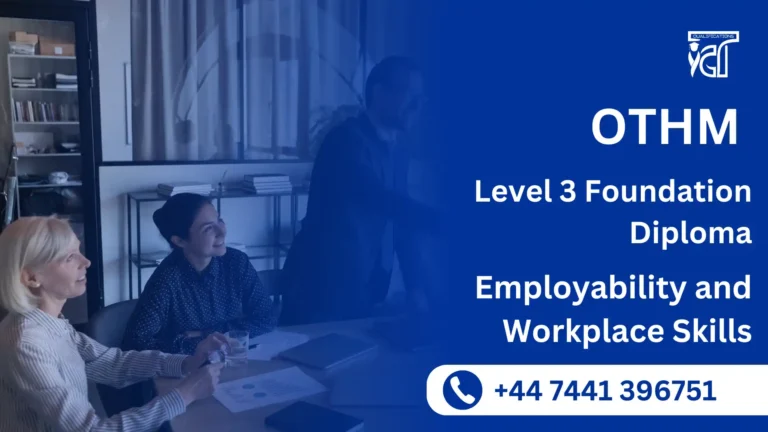The OTHM Level 3 Foundation Diploma in Health and Social Care is a prestigious qualification designed to provide learners with a strong foundation in the healthcare and social work sectors. Regulated by Ofqual (Office of Qualifications and Examinations Regulation, UK), this diploma is a fully assignment-based qualification, eliminating the need for traditional exams. It is ideal for those looking to advance in the healthcare sector, pursue further education, or gain essential knowledge and skills to work in care-based professions.
The OTHM Level 3 Foundation Diploma in Health and Social Care is tailored for individuals seeking to develop an in-depth understanding of health and social care principles. It focuses on key areas such as patient care, ethical responsibilities, healthcare policies, and professional development. The qualification provides learners with both theoretical knowledge and practical skills necessary for success in the healthcare industry.
The OTHM Level 3 Foundation Diploma in Health and Social Care is an excellent stepping stone for individuals seeking to build a career in the healthcare sector. With its flexible learning approach, globally recognized accreditation, and assignment-based assessment, this qualification is ideal for both aspiring professionals and those looking to enhance their career prospects in health and social care.
OTHM Level 3 Foundation Diploma in Health and Social Care
The qualification comprises six mandatory units, amounting to a total of 60 credits, with a Total Qualification Time (TQT) of 600 hours and 300 Guided Learning Hours (GLH) required for completion.
Mandatory units
| Sr# | Unit Title | Credits | GLH |
|---|---|---|---|
| 1 | Responsibilities of a Health and Social Care worker | 20 | 50 |
| 2 | Personal and Professional Development in Health and Social Care | 20 | 50 |
| 3 | Effective Communication and Ethical Practice in Health and Social Care | 20 | 50 |
| 4 | Health, Safety and Wellbeing in Health and Social Care Settings | 20 | 50 |
| 5 | Person-centred Approaches in Health and Social Care Settings | 20 | 50 |
| 6 | Effective Handling of Information in Health and Social Care Settings | 20 | 50 |
GLH (Guided Learning Hours) and TQT (Total Qualification Time) are terms commonly used in vocational qualifications to help define the amount of time a learner is expected to spend on heir studies.
1. GLH (Guided Learning Hours)
GLH refers to the number of hours a learner spends being directly taught, supervised, or supported during their course. This includes the time spent in activities such as:
- Classroom instruction
- Practical workshops
- One-on-one tutoring or mentoring sessions
- Online learning sessions with tutor support
In other words, GLH represents the time that learners are actively engaged with their instructors or learning activities.
2. TQT (Total Qualification Time)
TQT represents the total amount of time a learner is expected to invest in completing a qualification, including:
- GLH (Guided Learning Hours): Time spent on direct learning, as explained above.
- Self-Directed Learning: This includes time spent on independent study, research, assignment completion, preparation for exams, and any other work the learner does outside of direct teaching hours.
TQT is a broader measure that includes all the time required to achieve the qualification. It helps learners and employers understand the overall commitment required for the qualification.
Key Differences Between GLH and TQT:
- GLH focuses on direct learning with guidance or supervision.
- TQT includes GLH as well as independent study time and other learning-related activities.
Example:
If a qualification has a TQT of 600 hours and a GLH of 250 hours, it means the learner should spend 250 hours in direct learning (classroom, online, or tutor-led sessions) and 350 hours on independent study or research.
Learning Outcomes of OTHM Level 3 Foundation Diploma in Health and Social Care
Responsibilities of a Health and Social Care worker
- Understand working relationships in health and social care settings.
- Understand the importance of adhering to the agreed scope of the job role.
- Understand the importance of partnership working in health and social care.
Personal and Professional Development in Health and Social Care
- Understand what is required for competence in own work role.
- Be able to reflect on practice
- Understand how to evaluate own performance in the workplace.
- Understand personal development plans.
Effective Communication in Health and Social Care Practice
- Understand why effective communication is important in health and social care work settings.
- Be able to meet the communication wishes and preferences of individuals.
- Understand possible barriers to communication.
- Understand equality, diversity and inclusion within health and social care.
Health, Safety and Wellbeing in Health and Social Care Settings
- Understand responsibilities relating to health and safety in health and social care.
- Understand how to minimise the spread of infection
- Know how to recognise signs of abuse.
Person-centred Approaches in Health and Social Care Settings
- Understand person-centred approaches utilised in health and social care.
- Understand ways of working in a person-centred way.
- Understand the importance of establishing consent when providing support.
- Understand the importance of promoting active participation.
Effective Handling of Information in Health and Social Care Settings
- Understand handling of information practice requirements in health and social care settings.
- Understand good practice in handling of information.
- Understand practices relating to confidentiality.
Course Benefits of the OTHM Level 3 Foundation Diploma in Health and Social Care
1. Flexible and Assignment-Based Learning
Unlike traditional courses, this diploma is 100% assignment-based, offering flexibility for learners who may have work or personal commitments.
2. Recognized Qualification for Career Growth
As an Ofqual-regulated qualification, this diploma is recognized globally by employers and higher education institutions, making it a valuable credential for career progression.
3. Pathway to Higher Education
The diploma provides a strong foundation for further studies, including the OTHM Level 4 Diploma in Health and Social Care, and even undergraduate healthcare-related degrees.
4. Industry-Relevant Skills
The curriculum is designed to align with real-world healthcare and social care needs, ensuring graduates are work-ready with practical skills and theoretical knowledge.
5. No Exams – Stress-Free Learning
Assessment is based solely on coursework, removing the pressure of traditional exams and allowing learners to focus on practical learning and research.
6. Diverse Career Opportunities
The qualification prepares learners for various entry-level roles in health and social care, including:
- Healthcare Assistant
- Social Care Worker
- Support Worker
- Community Health Worker
- Further academic studies in nursing, social work, or healthcare management
1. Aspiring Healthcare Professionals
Individuals looking to establish a career in health and social care will benefit from this foundational qualification. Whether they aspire to become caregivers, support workers, or healthcare assistants, this diploma provides the necessary knowledge and practical skills.
2. Career Changers
This diploma is perfect for professionals from other industries who wish to transition into the healthcare sector. The assignment-based assessment allows learners to balance their studies with existing commitments while gaining the necessary expertise.
3. School Leavers and Recent Graduates
For those who have recently completed secondary education, this diploma provides a structured pathway to higher education or entry-level roles in healthcare. It lays the groundwork for future studies in nursing, social work, or healthcare management.
4. Existing Healthcare Workers
Current professionals in the healthcare sector, such as healthcare assistants or social care workers, can use this qualification to enhance their career prospects. It allows them to refine their knowledge and develop skills for supervisory or managerial roles.
5. International Students
Learners from across the globe seeking a globally recognized UK qualification can enroll in this diploma to boost their career prospects. The course’s flexible learning structure and assignment-based assessment make it accessible for students from different educational backgrounds.
Entry Requirements
Register Now
Qualification Process
Qualification Process OTHM Level 3 Foundation Diploma in Health and Social Care
- Self-Assessment:
Begin by evaluating your eligibility to ensure you meet the qualification requirements, including work experience, knowledge, and language proficiency. - Registration:
Complete your registration by submitting the required documents, including a scanned copy of a valid ID, and paying the registration fee. - Induction:
An assessor will conduct an induction to confirm your eligibility for the course and explain the evidence requirements. If you do not meet the criteria, your registration will be canceled, and the fee will be refunded. - Assignments & Evidence Submission:
Provide all assignments and the necessary evidence based on the assessment criteria outlined in the course. If you are unsure of the required evidence, consult with the assessor for guidance on the type and nature of evidence needed. - Feedback and Revision:
The assessor will review your submitted evidence and provide feedback. Evidence that meets the criteria will be marked as “Criteria Met,” while any gaps will be identified. You will be asked to revise and resubmit if needed. - Competence Evidence:
Submit final evidence demonstrating that all learning outcomes have been met. This evidence will be marked as “Criteria Met” by the assessor once it is satisfactory. - Internal Quality Assurance (IQA):
The Internal Quality Assurance Verifier (IQA) will review your evidence to ensure consistency, quality, and compliance with standards. - External Verification:
The IQA will submit your portfolio to OTHM External Quality Assurance Versifier (EQA) for final confirmation. The EQA may contact you directly to verify the authenticity of your evidence. - Certification:
Upon successful completion of all checks, OTHM will issue your official certificate, confirming that you have attained the OTHM Level 3 Foundation Diploma in Health and Social Care







